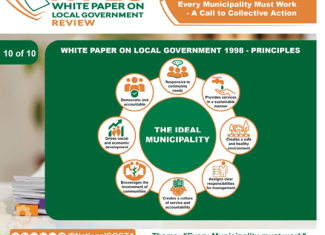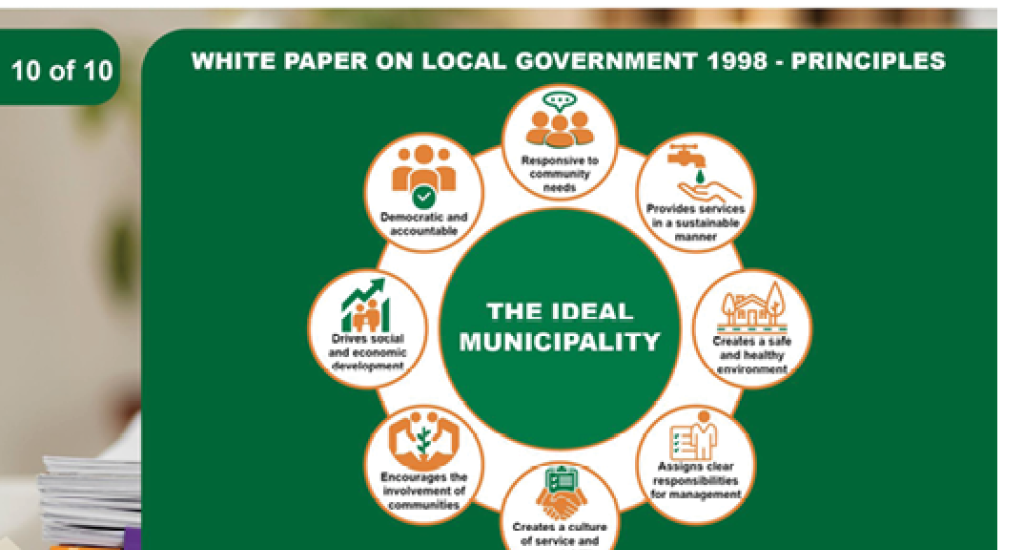Reimagining local government:
Why the White Paper review matters more than ever

We have begun with a comprehensive review process of the 1998 White Paper on Local Government.
The review of the White paper demonstrates our collective commitment to addressing the challenges facing local governance and shaping a future that aligns with the aspirations of all South Africans. The significance of the Local Government White Paper Review process is multifaceted, impacting various aspects of governance, community engagement and socio-economic development. This review is a crucial indicator of government's commitment to improving local governance structures and service delivery, both fundamental to effective democracy and citizen satisfaction.
To understand this process fully, it is essential to consider the historical context of local governance in South Africa. The White Paper on Local Government, adopted in 1998, established the foundation for developmental local government as a key pillar of South Africa's democracy. This policy framework not only expanded access to basic services for millions but also defined the local government sphere as one that operates at the forefront of service delivery, working closely with citizens and other societal entities to address social, economic and material needs while improving the quality of life. The original White Paper was visionary, introducing a developmental model that emphasised collaboration and community participation.
Since the end of apartheid, local governments have played a crucial role in transforming communities, ensuring equitable service delivery, and fostering democratic participation. However, this journey has come with significant challenges. Many municipalities have struggled with inefficiencies, corruption and neglect, leading to public disillusionment and a lack of trust in local governance systems.
On 19 May 2025, we officially launched a review of the White Paper, emphasising that local governments must adapt to a changing world characterised by urban growth, climate challenges, youth unemployment and digital transformation. Without this evolution, municipalities risk becoming irrelevant and obsolete. Central to the review is the need to restore public trust, which has been eroded by the issues and failures present in some municipalities. Rebuilding this trust is crucial and begins with accountability and the willingness to confront past mistakes. The review poses the following challenging questions:
- How can we ensure that councillors and municipal managers are qualified, accountable and focused on service delivery?
- How can we restore fiscal discipline so that ratepayers' money is used for delivery instead of waste?
- How can we empower traditional leaders and rural communities without undermining constitutional principles?
We all agree that the rationale for this review is both urgent and strategic, as South Africa’s socio-economic landscape has shifted dramatically. The population has grown, and poverty and inequality remain deeply entrenched. Political instability, skills shortages and revenue shortfalls have weakened municipal performance.
In response, the review must address these and many other challenges by proposing structural changes that enhance accountability and efficiency. Additionally, the review aims to promote greater accountability and transparency in local governance.
By emphasising a participatory approach to governance, the review seeks to empower communities to engage actively with their local institutions. It aims to enhance transparency through measures such as open budgeting processes and public consultations, ensuring that municipal leaders are held accountable for their decisions and actions. This shift towards transparency is crucial for rebuilding trust between government and communities, allowing citizens to have a voice in the decision-making processes that affect their lives.
A key principle of the review recognises that meaningful community engagement is not just beneficial but necessary for effective governance. To this end, the White Paper calls for the establishment of forums, workshops and other platforms that allow citizens to express their concerns and suggestions. Such engagement serves two purposes: it empowers communities and helps local governments make informed decisions that truly reflect the needs of their constituents.
The review processes aim to rectify historical imbalances by ensuring that all voices are heard, particularly those that have been silenced in the past. It calls for inclusive engagement, reaching beyond the usual voices, and providing marginalised communities (such as informal traders, women, youth, traditional leaders and rural communities) the opportunity to participate. We emphasise this because real change must be rooted in lived experiences and supported by evidence.
This review presents an opportunity to rewrite the rulebook and introduce bold, forward-thinking reforms, including:
- Smart governance tools that track performance and improve transparency through real-time data systems.
- New funding models that incentivise ethical leadership and penalise mismanagement.
- The professionalisation of local government, establishing minimum qualifications and ethical standards for officials and councillors.
- Climate resilience strategies that future-proof infrastructure and services against environmental risks.
- Improved intergovernmental coordination, particularly through the District Development Model, to streamline planning and reduce duplication.
Consultations already underway across provinces are shaping a framework and roadmap that is practical, coherent, and values-driven. They reflect the spirit of the Constitution and the realities of 21st Century South Africa while being both inclusive and practical.
The outcome should be a modernised local governance structure that characterises and defines a new era of capable, developmental, ethical and innovative municipalities, ultimately improving lives, rebuilding communities and restoring the resilience of our democracy.
Every municipality must work, not just in theory, but in practice, and for everyone.❖




